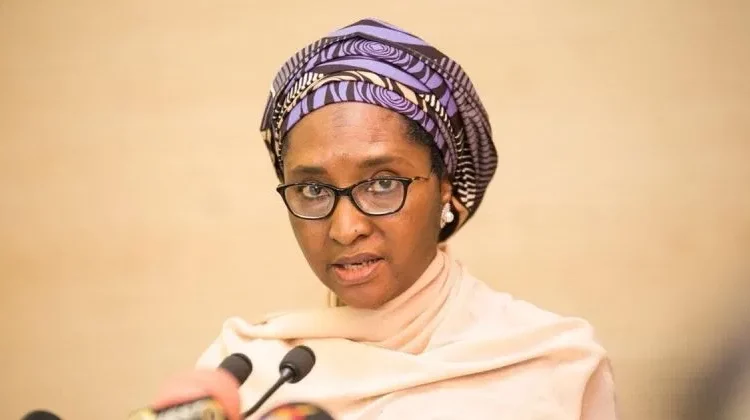Minister of finance, budget and national planning, Zainab Ahmed yesterday disclosed that the federal government paid N18.397 billion in subsidy per day.
The minister also said that a total sum of N6.210 trillion had been paid as fuel subsidy to independent oil marketers from 2013 to 2021.
This disclosure has elicited reactions from some quarters who feel the subsidy figures are falsified while others say the subsidy regime is unsustainable as it is hurting the country’s economy.
The chief executive officer, Centre for Promotion of Private Enterprise (CPPE), Dr. Muda Yusuf, said the fuel subsidy problem will cripple the entire economy unless urgently tackled.
He, however, conceded that the government cannot suddenly remove the entire subsidy at this time as the shock on the citizens will be unbearable.
“If we allow the fuel subsidy problem to continue, it will cripple the entire economy and the roof will be falling on all of us. And we cannot afford for that to happen. But I think we can begin to take steps to gradually phase it out,” he said.
He noted that Nigerians living outside Lagos and Abuja are already paying some form of a market reflective prices for petrol since they do not buy at the official rate.
However, stating that the government cannot continue to bear the burden of subsidy payment, the finance minister said Zainab Ahmed said that there was a recommendation of a meeting of all the stakeholders, including the leadership of the National Assembly and the political parties, to decide whether to stop it or sustain the payment.
She made the disclosures before the House of Representatives ad-hoc Committee investigating the subsidy payments regime from 2013 to 2022 led by Hon. Ibrahim Aliyu.
Ahmed said: “First of all, starting from the parameter that is used for the assessment of subsidy, especially for 2023, we used information as provided by NNPC and regulator. And for 2023, the projection is that the average daily truck-out will be N64.96 million litres per day; that is about 65 million per day, using an average rate at open market rate of N448.20k and then a regulator pump price of N165 per litre. This gives us an average under recovery, that is, the difference between N165 and 448 of 283.2. So just multiply the amount of litres per day, the open market exchange rate of naira to the dollar and then the gap between the pump price and open market price; the total amount of subsidy per day is N18.397 billion per day. So, if you are projecting for the full year from January to December, it will be N6.715 trillion. If you are projecting for half a year, it will be 50 percent of that – N3.375trillion, and I said earlier, on the recommendations that we sent to Parliament for consideration on MTEF in half year, that will be N3.375 trillion.
“Fuel subsidy is the difference between the pump price which is now fixed at N165 and the landing cost which we are projecting at an average of N448 per litre in 2023; even now the cost is around that.
“So, the PMS subsidy we are carrying today in the nation is around N283 per litre.”
The minister, however, said that the ministry paid the sum of N1.774 trillion from 2013 to 2016 while the rest came under PMS under-recovery by the NNPC Limited.
She explained that the federal government is paying the total sum of N18.397 billion as subsidy per day.
The finance minister added that in the Medium-Term Expenditure Framework (MTEF) already sent to the National Assembly, the government projected for N3.335 trillion as subsidy for half a year.
“One thing that stands out in the MTEF was that if the nation holds on to fuel subsidy as it is designed now, we will be incurring from January to December subsidy cost of N6.4 trillion. But we suggested to the federal executive council, and council approved that maybe we could look at the option of…So if we did that, then the cost will be N3.35 trillion, which is half of the N6.7 trillion
“FEC approved the second option, that’s the option that was conveyed by his excellency, the president to the National Assembly.
“But let me also say that even though this is a reduced option, it would mean that we are borrowing more than we’ve borrowed. In 2022, we are carrying the cost of subsidy throughout the whole year.
“That’s how we came back to parliament with an incremental expense from NN443 billion which we had planned to up to N4 trillion subsidy expense in 2022.”
The minister described the situation as undesirable and unsustainable, saying “it’s putting the country in a very serious, dire, financial situation and we do hope that we will be able to exit this subsidy regime in the shortest possible time.”
According to her, the total sum of N6.210 trillion was expended from PMS under recovery by NNPC and payment to independent oil marketers from 2013 to 2021.
Speaking on transfer of funds by NNPC and its affiliates to the treasury single account, she said the ministry had obtained evidence as enclosed in annex 9 of the report.
“The ministry is also not in the position to provide a statement of account of NNPC and its affiliates. The parliament should ask for this directly from them.”
While suggesting a way forward, the minister said, “When we engage the leadership of the National Assembly, they recommended a national stakeholders forum that will bring all major stakeholders together, including all the political parties. We submitted that to the FEC and it gave its approval and the government is working on that. It is important so that if all stakeholders agree, we know what exactly we are dealing with. I do hope that is done very soon because we cannot continue to carry the burden.”
The chairman of the ad-hoc committee, Hon Ibrahim Aliyu, queried the rationale behind NNPC’s deduction from source the sum of N1.66 trillion against the sum of N1.15 trillion paid to oil marketers in 2021.
He also contested the formula for the computation of subsidy payments by the minister, saying they may have been overblown.
The committee therefore demanded documentary evidence of the payments.
He said: “The N6.7 trillion required for 2022, why I’m disturbed is because the 2023 financial year is approaching by September, we will be expecting Mr. President’s budget submission, and the MTEF is already before the National Assembly.
“You see, if you look at the latest average daily truck-out quantity, N64,964,400 in 2012, there was a report and the total consumption was put at 31,500, so it’s very difficult to imagine how you can have a near 100% increment in consumption within a period of 10 years.
“And then going by the permutations or calculations, Honourable Minister, if you are using a 42,000 litre-capacity truck, if you divide it by the 64,964,400 litres, you arrive at 1,547 trucks daily. And if you take an average, simple division by 37 states including Abuja, you have 41 trucks of 42,000 litre-capacity given to those states, maybe my own state being a smaller state in terms of consumption may be requiring less, maybe 10 trucks.
“So, what I’m saying in essence, minister, we are talking of daily consumption, Monday through Sunday and Monday again, no public holidays, in fact, during COVID-19 when there was lockdown and limited movement, the consumption rate remained the same. So, I wondered how the Ministry could accept this kind of figure. You see, it’s difficult.”
Continuing he said petro l subsidy benefits the haves more than the have-nots.
“If you look at the subsidy itself, who is it for, is it for the common man? This subsidy is for me, you and some of us that own cars or motorcycles, but subsidy is not for the common man that only needs a few litres to go back to the farm.
“But to be honest, this figure is overblown and I think the Ministry should have done due diligence to be able to arrive at a relatively acceptable consumption rate,” he said.
Speaking on the government’s decision to suspend subsidy removal, BudgIT’s extractive lead, Adejoke Akinbode said: “The current cost of petroleum subsidy to Nigeria, along with other socio-economic implications, necessitates its removal. Nevertheless, a couple of palliative measures must be in place for subsidy removal to gain public acceptance.”
Reviewing progress so far made in the implementation of the law, BudgIT noted that subsidy removal, a critical aspect of the Petroleum Industry Act (PIA) which was due for implementation, was put on hold, adding that this aspect should have been implemented six months after the passage of the PIA.
The organisation however, said, the federal government extended the timeframe for the complete removal of fuel subsidy because it needed to put necessary structures in place to cushion the impact of the subsidy removal on the citizens.
Speaking also, former president of the Petroleum and Natural Gas Senior Staff Association of Nigeria (PENGASSAN), Brown Ogbeifun, said the NNPC should make bold its Major Turnaround Maintenance (TAM) in decades so that it shall produce and sell its products under a deregulated regime. That, he said. would save forex from importation for Nigeria, generate employment and become a major player in the oil and gas value chain and address the petroleum subsidy issue.
The chief executive officer of Centre for the Promotion of Private Enterprise (CPPE), Muda Yusuf, projected that the cost of funding oil subsidy would be significantly higher this year because of the surging crude oil price.
Yusuf said if the oil price remains high for most part of the year, the subsidy cost could go as high as N5 trillion or even more by the end of the year.
This, he noted, would surely affect funding for critical infrastructure such as roads, railways, healthcare education, and even security while the petroleum products smugglers, beneficiaries of the fiscal leakages in the fuel subsidy ecosystem, and their collaborators, will continue to smile to the banks for the next one year.
Some states, he said, would struggle to pay salaries, especially states that are heavily dependent on federal allocation. Some, he added, may have to lay off some of their work force as many will struggle to meet their financial obligations as subnationals.
He, however, said that there is a need to creatively manage the transition from the current pricing regime to a fully deregulated arrangement.
“It is a tricky issue which could pose a serious challenge to government if not tactically managed. The reality is that the sentiments among the citizenry are not favourable to the deregulation of petroleum product pricing or petrol subsidy removal. Even some elite are curiously not persuaded on the justification for the subsidy removal,” he pointed out.
He warned that if the policy transition is not properly managed, the risk of a social and political backlash could be quite high.
“No doubt there is a sound economic and business case in favour of fuel subsidy removal, but the social and political contexts are equally critical.
Certainly, the subsidy is not sustainable, which is why there is need to accelerate engagement with the relevant stakeholders to come up with a policy transition strategy that is sustainable, realistic and pragmatic.
The conversation should not only be economic, but also social and political,” he said.
On its part, BudgIT has noted that the current cost of petroleum subsidy is impacting heavily on the revenue of government and has therefore called for timely implementation of the Petroleum Industry Act and the dismantling of the subsidy regime.






